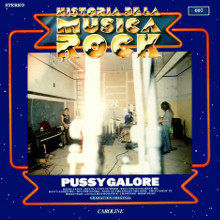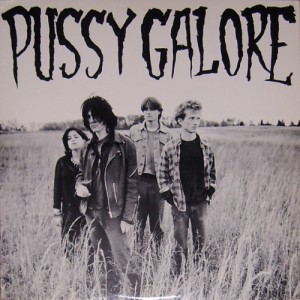| 15 July 1988 | New York Times | – |
![Pussy Galore - Promotional Photo [#9] (PHOTO, US)](http://www.pop-catastrophe.co.uk/wp-content/uploads/2013/06/pg1988untitled.jpg) |
|
| NOTES: | |
| Preview for Pussy Galore set at Big Kahuna for the New Music Seminar with White Zombie, Naked Raygun and Abecedarians on 16 July 1988.
Pussy Galore mention:
Photo Credit: Michael Lavine (Pussy Galore promotional photo from October 1988) |
|
| FULL ARTICLE TEXT: | |
| JAZZ CLUBS Pop/Jazz “Alternative Is the Word At Festival” Malhar Ferguson TONIGHT, the ninth annual New Music Seminar sets up camp in town. Devoted to alternative music, it is bringing with it four days’ worth of music-related seminars and more than 350 acts, which will perform at 29 venues. Everyone will be playing, from Iggy Pop, on the comeback trail, to Ashwin Batish, an Indian rock sitarist. There will be special concerts, including a show sponsored by the French organization Rock Against Racism featuring the reborn Ohio Players and the Gipsy Kings, French musicians of Spanish descent who merge flamenco, rock and Brazilian sounds. But the majority of the shows are pure American garage-band rock-and-roll. It is an event that begs a definition of alternative music. “Alternative music is music that hasn’t yet achieved a mainstream audience,” said Mark Josephson, the executive director of the festival, which runs through Wednesday. “Alternative isn’t new wave anymore, it’s a disposition of mind. Alternative music is any kind of music that has the potential to reach a wider audience. It also has real strength, real quality, real excitement, and it has to be socially significant, as opposed to Whitney Houston, which is Pablum.” If the festival is any indication, alternative music, as imagined by Mr. Josephson and other rock entrepreneurs, is becoming increasingly catholic, though the festival itself still relies heavily on rock. The Meat Puppets, perhaps the most popular band on the underground rock circuit and a group likely to break out to a larger audience, will be playing. Pussy Galore, one of New York’s best bands and a group likely to stay on the the underground circuit because of the harshness of its music, will be performing. New bands – San Francisco’s Beatnigs, for example – will make debut appearances. And rap, which has been represented in the past, is taking up a larger part of the festival than in previous years. “We have incredible rap shows,” Mr. Josephson said, “not just featuring the guys who’ve sold 4 million records, but up-and-coming acts like M. C. Lyte, Schooly D, all excellent groups. The seminar is making a statement about rap: Enjoy yourself, but this is music, this is art, this isn’t recreation for crack smokers, and commercially this is the place to be. We’re in the midst of revolution, where rap artists are selling substantial numbers but not getting radio support or press coverage.” “In a certain way, rap music is alternative,” the rapper Big Daddy Kane, who will be performing at the Ritz on Monday, said. His album “Long Live the Kane” (Cold Chillin’ Records) entered Billboard’s black music charts at No. 44 and is heading higher. “Good rap records don’t get too far, but rap records that are made for crossing over to white audiences do go a long way. Good records don’t make it, so I feel rap is still underground. You rarely hear rap on the radio; radio stations considered black aren’t playing black music.” “Rap is good for politics,” Mr. Kane said, echoing a political concern that can be found among many of the festival’s acts, “because when you make a rap record, you put good music on a track and people listen to you. It’s easier than trying to preach. Then they start learning the lesson. I did a show in North Carolina, and usually, girls come and hang out after the show. This time young guys came asking questions: ‘Are you a Muslim? What does this or that mean?'” Politics at the Pyramid. The Beatnigs, made up of four black men and one Chinese man from San Francisco, are playing at the Pyramid Club tomorrow night; it is an intensely political band whose debut album, “The Beatnigs” (on Alternative Tentacles Records), is a powerful conglomeration of taped sounds – speeches by Malcolm X, for instance – industrial noise made with saws, sirens and oil drums, and a conventional rhythm section. “The things I speak about on the album are pertinent in my life,” said Michael Franti, who writes all the lyrics and plays bass. The group started as a loose association of musicians playing mostly percussion instruments for dance and performance artists, then slowly metamorphosed into a band. “It’s been interesting,” Mr. Franti said. “In San Francisco we started out with an art-crowd audience, but since then, we’ve developed a big following from hard-core and rap audiences. This is our first tour across country, and in Idaho, a state notorious for the Aryan Nation, the response was encouraging. The kids at the show were all young and it brought out a feeling among them that people of all races had a right to live together.” “It seems as if there’s a reaction to the past eight years of the Reagan Administration; people are ready to go ahead, rather than to go back,” Mr. Franti said. “When we go to a show and say the things that we say, it seems like we’re a motivating force for people who’ve felt repressed saying these things for the last eight years.” Seething With Frustration. The Galore group, which will be performing tomorrow at Big Kahuna, has been playing together for three years and is one of the New York scene’s main attractions. Its latest album, “Right Now!” (Caroline), seethes with frustration with the formal and cultural confines of rock. And though the group has been well received critically, the band, with its wild, almost abstracted rock riffing, doesn’t have much of a chance to go beyond the underground audience. “We’ll never be mainstream,” said Jon Spencer, the band’s lead singer and guitarist. “From the word go-the name isn’t exactly salable – it’s not what we’re about. It’s not what we aspire to. We’re not in it for a job. If that happens, that’s fine.” There’s no way out: once you’ve picked a guitar, you are part of the whole thing.” A group that does seem ready to reach a larger audience, and one that’s a bit more optimistic about rock as a social force, is the Meat Puppets, from Phoenix. The band has been playing together for eight years, and will be at CBGB tomorrow night for its first New York performance in more than a year. The group, which has logged more than 100 shows so far this year, is part of a hard-working national underground rock circuit on which bands hone their skills. A Fondness for Hooks “I love melodies arranged over traditional chords,” said Curt Kirkwood, the band’s bassist and singer. “People are suckers for good melodic hooks; I love to write them so I can hear the hooks with a band raging behind them.” “I don’t care about popularity in the same way Dukakis does,” Mr. Kirkwood said, “but it would be swell if people could hear our music. I really like the attention we are getting; it’s built on easy, steadygoing increase. We act as our own managers, and the question is, ‘Can we handle getting any bigger?'” Like many underground acts, the members of the Meat Puppets have ambivalent feelings when it comes to major-label record companies. “I’d sign to a major label if it didn’t look like I was going to get burned,” Mr. Kirkwood said. “A lot of the bands on our circuit, the majors don’t have a handle on how they’ve been promoted. I’m seeing bands be co-opted; a lot of majors have signed bands from the garage circuit, strictly to have a token garage band on their label, not as something commercially viable.” “We’re not a punk-rock act,” he said. “We’re not going to be co-opted, and we’re as viable as anyone. So if a major comes to us, I’d ask for a typical amount of money and an atypical amount of control, because I’m not a beginner. A record company doesn’t have to create a shtick for us. We just did the Spin magazine bathing-suit issue, so we’re trying to get our sexual side out – what little of it there is.” |



![Sugarshit Sharp [1988] (LP, UK)](http://www.pop-catastrophe.co.uk/wp-content/uploads/2013/07/pgc-300x300.jpg)
![Right Now! [1987] (LP, US)](http://www.pop-catastrophe.co.uk/wp-content/uploads/2013/06/pgc3-300x300.jpg)





